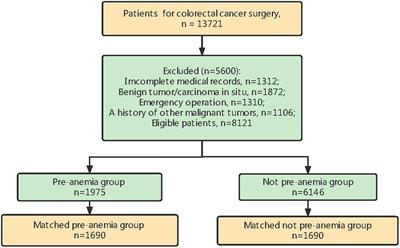
Unmasking the Relationship: How Colon Cancer and Anemia are Intertwined
Colon cancer and anemia are two separate medical conditions, but they are often related. Colon cancer is a type of cancer that develops in the colon or rectum, while anemia is a condition in which the body doesn’t have enough healthy red blood cells to carry adequate oxygen to the body’s tissues. In this article, we will explore the relationship between these two conditions and how they are intertwined.
Colon Cancer and Anemia: Understanding the Link
Anemia is a common condition among cancer patients, and it is particularly prevalent in those with colon cancer. The link between colon cancer and anemia is multifaceted, and it can be attributed to various factors. For instance, the growth of cancerous tumors in the colon can cause bleeding, which leads to a loss of blood and subsequently anemia. Moreover, cancer can impact the body’s ability to produce red blood cells, leading to the development of anemia.
Furthermore, the treatment of colon cancer, such as chemotherapy and radiation therapy, can also contribute to anemia. These treatments can affect the bone marrow’s ability to produce red blood cells, leading to a decrease in red blood cell count and anemia. Additionally, the symptoms of colon cancer, such as fatigue, weakness, and unexplained weight loss, can worsen with anemia, making it important to address the condition promptly.
Symptoms and Diagnosis
The symptoms of anemia can vary, but common signs include fatigue, weakness, dizziness, headaches, and pale skin. In the context of colon cancer, these symptoms can overlap with the manifestations of the disease, making it challenging to diagnose anemia as a separate condition. As a result, it is essential for healthcare providers to conduct a comprehensive assessment to differentiate between the symptoms of colon cancer and anemia.
Diagnosing anemia often involves conducting blood tests to measure red blood cell count, hemoglobin levels, and hematocrit. In the case of colon cancer patients, monitoring these blood parameters is critical to identifying anemia and determining appropriate interventions. Additionally, healthcare providers may consider other tests, such as stool exams and colonoscopies, to detect the presence of colon cancer and potential bleeding in the digestive tract.
Treatment and Management
The treatment and management of anemia in the context of colon cancer aim to address the underlying causes and alleviate symptoms. In cases where colon cancer is contributing to anemia through bleeding, treatment focuses on addressing the cancer itself. This can involve surgical interventions to remove the cancerous tumors, chemotherapy, radiation therapy, or targeted therapy. By addressing the root cause of bleeding, it is possible to mitigate the development of anemia.
Moreover, for colon cancer patients undergoing treatments that can contribute to anemia, healthcare providers may recommend interventions such as blood transfusions or the administration of erythropoiesis-stimulating agents to boost red blood cell production. Additionally, dietary modifications and iron supplementation can be part of the management plan for anemia. It is crucial for healthcare providers to tailor treatment strategies to the individual needs of each patient while considering their overall health status and treatment goals.
Preventive Measures and Supportive Care
In addressing the relationship between colon cancer and anemia, preventive measures play a crucial role in reducing the risk of developing anemia and managing the condition proactively. This can include regular monitoring of blood parameters, screening for colon cancer, and addressing symptoms promptly. Moreover, promoting a healthy lifestyle, including a balanced diet rich in iron and other essential nutrients, can help prevent the development of anemia.
It is also important to provide supportive care for patients with colon cancer and anemia. This can involve addressing the psychological and emotional impact of cancer and anemia, as well as providing resources and support for managing the practical aspects of medical care. Additionally, healthcare providers should prioritize open communication with patients to ensure that they understand the relationship between colon cancer and anemia and are actively involved in their care.
The Importance of Early Detection and Multidisciplinary Care
Early detection of colon cancer and anemia is vital in improving outcomes and enhancing the quality of life for patients. Recognizing the signs and symptoms of these conditions, conducting regular screenings, and receiving timely medical care are essential in managing colon cancer and anemia effectively. By receiving comprehensive care from a multidisciplinary team of healthcare professionals, patients can benefit from a holistic approach that addresses the complex relationship between colon cancer and anemia.
In conclusion, colon cancer and anemia are intricately linked, and understanding their relationship is crucial for providing comprehensive care to patients. By recognizing the factors that contribute to the development of anemia in the context of colon cancer and implementing effective treatment and management strategies, healthcare providers can improve outcomes and support the well-being of patients. Through early detection, tailored interventions, and multidisciplinary care, the intertwined nature of colon cancer and anemia can be unmasked, paving the way for a more proactive and holistic approach to addressing these conditions.












